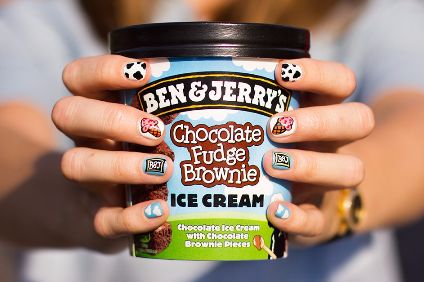
Unilever ice cream brand Ben & Jerry’s has said it will no longer use ingredients based on glyphosate-dried crops after traces of the herbicide – typically used as weedkiller – were found in its ice cream.
European Union and US organisations, led by US-based Organic Consumers Association (OCA), will confirm at a press conference in Brussels today (10 September) that samples of Ben & Jerry’s ice cream from France, Netherlands, Germany and the UK contained glyphosate, the primary ingredient in Monsanto’s Roundup herbicide.

Discover B2B Marketing That Performs
Combine business intelligence and editorial excellence to reach engaged professionals across 36 leading media platforms.
Ben & Jerry’s has acted quickly to mitigate against possible reputational damage.
In a statement it said it would, by 2020 at the latest, no longer use ingredients based on glyphosate-dried crops.
“We understand and share our fans’ desire to limit the amount of chemicals in the food system, which is why this step is important. In addition, we intend to advocate for policies that would end use of glyphosate as a chemical drying agent,” it said
Ingredients like wheat and oats are commonly sprayed with glyphosate as a drying agent before harvest.

US Tariffs are shifting - will you react or anticipate?
Don’t let policy changes catch you off guard. Stay proactive with real-time data and expert analysis.
By GlobalDataGlyphosate was detected in 12 of 14 Ben & Jerry’s ice cream samples, at levels as high as 1.228 ng/mL, according to John Fagan, chief scientist for HRI Labs, which conducted the tests.
Ben & Jerry’s was quick to point out that this presented no danger to consumers.
“We’d like to reassure our fans that our products are safe to eat and that the trace levels of the herbicide glyphosate detected were significantly below safe levels according to all global food safety regulations,” it said.
“Even the lab that performed the tests of US and EU flavours admitted in the New York Times that the levels found in Ben & Jerry’s products “would seem totally irrelevant”.
But Dr. Gilles-Eric Séralini, author of numerous studies on Roundup/glyphosate and one of the speaker’s at today’s press conference, disagreed.
He said: “Research indicates that levels of glyphosate in most samples likely pose a health risk. The regulatory levels set in the EU and US are based on outmoded toxicology models that fail to account for the properties of hormone disrupters like glyphosate-based herbicides, which can damage health at very low levels.”
Ben & Jerry’s said it was disappointed, but not totally surprised. that Glyphosate was found in the ice cream samples.
“{It} is one of the most widely used herbicides in agriculture and is everywhere – from mainstream food, to natural and organic food, and even rainwater – and that’s the issue,” it said.
Ben & Jerry’s has also said it will be bringing an “innovative,” new product line to market in 2018 that will source 100% organic dairy in the base mix.
“We believe this sends an important signal to our fans and suppliers of our support for a more sustainable approach to agriculture. We anticipate our new line will represent up to 6% of our total US sales,” it said.
But Ronnie Cummins, OCA international director, said: “Ben & Jerry’s announcement yesterday that it will source 6% organic dairy is positive news. But that leaves 94% of its supply coming from conventional dairies which use massive amounts of GMO animal feed. We will push for a transition to 100% organic, backed by a legally binding contract.”





